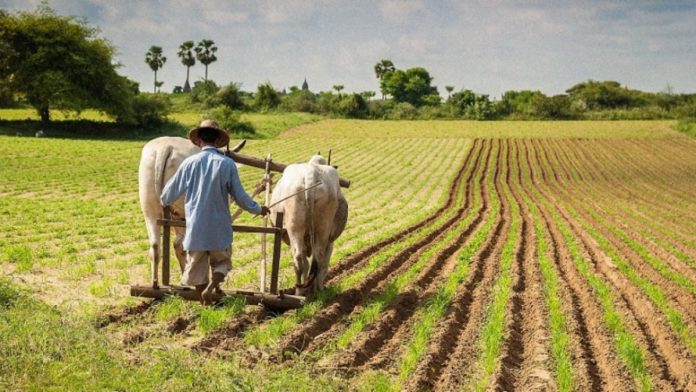ISLAMABAD, Jul 23 (Alliance News): With country’s major cash crops and raw materials coming from the agricultural sector, its efficient performance always bore pivotal importance to feed the populace and boosting industrial growth.
However, like many other sectors of economy, the agricultural sector also suffered a lot in the post-COVID economic recession globally and internal economic turmoil resulting in price hike of inputs and energy.
Therefore, the government had to introduce a multi-billion rupee Kissan Package to revive this sector and enhance the per-acre output of major and minor crops, aiming to achieve sustainable growth and economic development.
It was a much-needed package designed to breathe new life into the ailing agriculture sector, offering a range of remedies and support mechanisms for the agricultural industry and farmers.
Especially to address problems of small farmers, the Kissan Package provides tangible solutions, encompassing various components meant for enhancing agricultural productivity, alleviate financial burdens and promote sustainable practices.
“The farmers have started reaping benefits of this package as the government is disbursing an amount of Rs 6,769.5 million to subsidize the cost of cultivation for poor farmers in the form of interest-free loans in flood-affected areas,” said Imtiaz Ahmed Gopang, Food Security Commissioner at Ministry of National Food Security and Research.
“This amount has been disbursed among 30,362 borrowers by ensuring access to small landholders. The credit facility would help enhance their farm income and alleviate poverty from rural areas of the country,” he stated.
“These small farmers with land holding up to 5-12 acres comprise around 86 percent of the total land holdings and play a critical role in agriculture development,” Gopang said. “Therefore, the government is ensuring availability of all other inputs including high-yielding seeds, quality of pesticides and fertilizers on controlled rates to facilitate them.”
He said an amount of Rs1.48 billion has been sanctioned for waiver of markup on outstanding loans for subsistence farmers in flood-affected areas to revive their farming that was badly affected by flash floods.
To support farmers affected by floods, Prime Minister Shehbaz Sharif had announced a relief package worth Rs1.8 trillion in October 2022. This package was aimed to provide assistance to poor farmers, particularly those who suffered losses of their crops during devastating floods.
Economic Adviser to the Ministry of National Food Security and Research, Dr Haroon informed that by last month (June), the government under the Prime Minister Kissan Package had disbursed an amount of Rs1,567.9 billion to support farmers and stimulate the agricultural sector.
“Disbursement between July 2022 to June 2023, reached 86 percent of overall targets set. The agriculture lending banks disbursed Rs1,567.9 billion during the specified period, benefiting 30,362 borrowers to improve the per-acre output of crops and foster sustainable agricultural practices,” he remarked.
Additionally, he said the government disbursed Rs12,817 million under Prime Minister Youth Business and Agriculture Scheme to 23,857 farmers to provide financial assistance and support to young farmers in agriculture entrepreneurship.
Dr Haroon said that recognizing the importance of farm mechanization, the government also provided Rs1,056 million to 507 farmers under the markup and risk scheme.
Moreover, he said, the State Bank of Pakistan’s Refinancing Facility for Modernization of SMEs (RFMS) allocated Rs5.414 billion to include agro-SMEs in the SME modernization scheme. “Out of this amount, Rs2.953 billion has been availed by agro-based SMEs, leading to the overall development of the agricultural small and medium-sized enterprises.”
An analysis of the disbursement data reveals that out of a total of Rs1,567.9 billion disbursed so far, Rs 816.6 billion was allocated to farm sector and Rs751.4 billion to the non-farm sector from July 2022 to June 2023.
According to the Economic Survey of Pakistan 2022-23, despite the challenges posed by the floods in 2022, the Rabi season crops exhibited higher yields with the agricultural sector witnessing an overall growth of 1.55 percent.
Key crops like wheat, sugarcane and maize experienced positive growth percentages of 5.4, 2.8, and 6.9 respectively. Additionally, livestock activities gradually normalized, contributing to the sector’s stability.
Although some crops experienced a decline of 3.20 percent, other crops, primarily oilseeds, witnessed an increase of 0.23 percent, contributing 3.32 percent to Gross Domestic Product.
The disbursement of Rs1,567.9 billion under the Prime Minister Kissan Package and other related schemes highlights the government’s commitment to revive the agriculture sector and stimulate economic growth.
The financial assistance, interest-free loans, and support for mechanization definitely empowered farmers to enhance per-acre crop outputs and the relief package for flood-affected farmers paved the way to mitigating the impact of natural disasters and supporting vulnerable communities.
Despite numerous challenges, the positive growth in crop production is a testament to the resilience of the agricultural sector.
Therefore, continued investment and focused efforts will be vital to sustaining this positive trajectory and fostering long-term economic development.
In this scenario what is direly needed is continuity of policies and ensuring that the produce of farmers is purchased at prescribed rates and not leaving them at the mercy of market mafias and commission agents who often usurp their hard-earned money.


